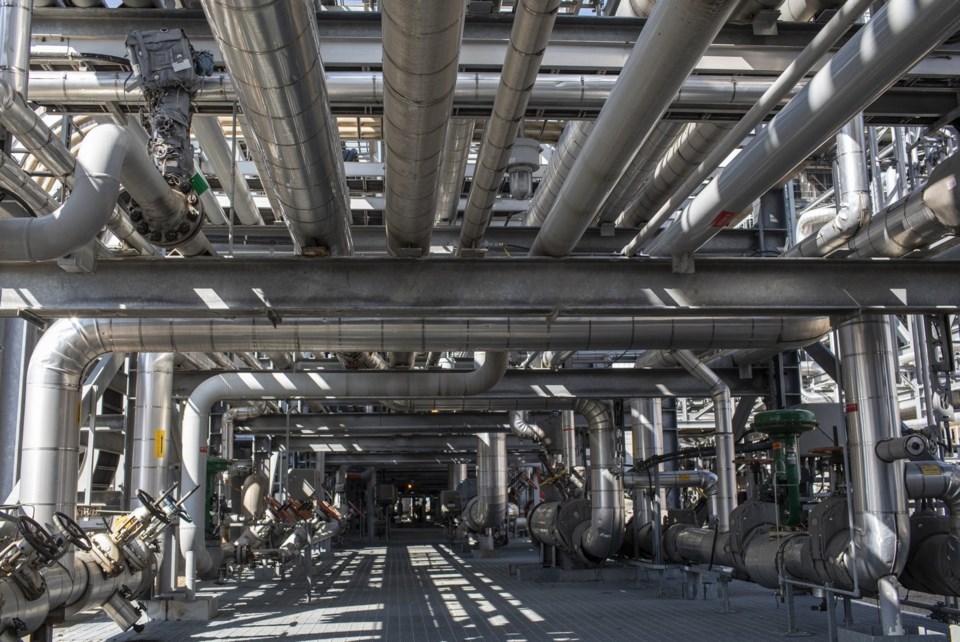EDMONTON — Alberta's government is looking to give the green light to hydrogen as a home and commercial heating fuel in a move it says will boost demand and reduce emissions.
If passed, legislation tabled by Utilities Minister Nathan Neudorf would allow utility companies to blend hydrogen into their supply of natural gas.
Neudorf told reporters that Alberta’s estimated annual production of about 2.4 million tonnes of hydrogen “presents an enormous opportunity,” but his bill doesn’t mean hydrogen will make its way into every home right away.
The bill stipulates any company looking to make use of hydrogen will need customers to sign off on receiving the blended heat source beforehand.
It also requires any company looking to recoup costs through consumers for the infrastructure needed to incorporate hydrogen to charge only those receiving the blended fuel, which Neudorf said would be more expensive than natural gas alone.
Neudorf told reporters that safety is top of mind, and the province will be working with regulators to set an acceptable blending rate since hydrogen is easily ignitable and more explosive than methane.
He said current standards point to a five per cent hydrogen blend as a safe amount.
“It's about choice, it's about safety, and it's about providing the correct parameters to allow a new and innovative technology and product to continue to evolve within the province,” Neudorf said.
The five per cent maximum Neudorf cited is also the cap put in place by utility provider ATCO as part of its pilot project in Fort Saskatchewan, Alta. Since 2022, ATCO has been providing just over 2,000 homes and businesses in the city with a hydrogen-blended natural gas.
Citing desires for low-emission options, Neudorf said he expects many more Albertans will want to receive a hydrogen blend to heat their homes and businesses.
A 2023 University of Alberta study found that a 15 per cent hydrogen blend would reduce Alberta’s greenhouse gas emissions by a maximum of five per cent, and likely lead to cost increases for consumers to account for increased hydrogen production and transportation infrastructure.
Sharif Haji, Opposition NDP utilities critic, said the move to allow for hydrogen blending in the sale of natural gas was overdue but said it’s unclear how long it will take for hydrogen-blended fuel to hit the market.
"There is also no clarity in terms of cost ... and what it will cost the ratepayer," he said.
Neudorf's bill also sets the stage for Alberta to make changes to its electricity market as part of a substantial system overhaul, although many of the technical details of that overhaul are still being finalized.
One of the major changes being planned is to introduce a "cost-causation" philosophy when it comes to building new transmission lines or grid capacity. This means shifting the cost from Albertans, who currently pay for capacity building projects, to energy producers — in certain cases.
Neudorf said he expects this change will lead to a more efficient use of Alberta's existing electricity infrastructure.
However, some analysts are concerned this change, as well as a planned abandonment of grid access, guarantees in favour of a new transmission planning framework, could make renewable energy products unviable or at least put them at a disadvantage.
"We promised a zero congestion system, meaning that every generator should be able to get their electricity to market, and that's not the case anymore," said Vittoria Bellissimo, the president of the Canadian Renewable Energy Association.
"Renewables should not be paying for capacity products in the market. This is not how other markets operate, and it won't incent new supply in the market."
Jason Wang, a senior electricity analyst at the clean energy think tank the Pembina Institute, said making it more difficult for renewable energy sources to come online means Alberta will miss out an opportunity to improve grid affordability and reliability in the long term.
"Our grids need to be able to make the most use of those technologies," Wang said.
The system overhaul is expected to be complete by 2027, but as of last week major changes were still being made to the plan by the Alberta Electricity System Operator, or AESO, the province's non-profit grid operator.
This report by The Canadian Press was first published April 10, 2025.
Jack Farrell, The Canadian Press




